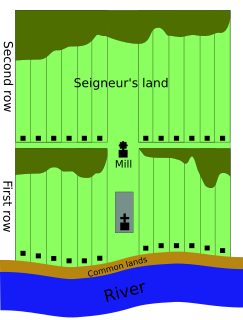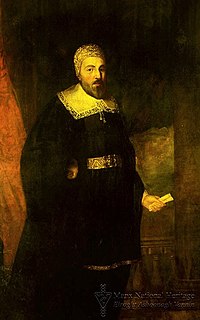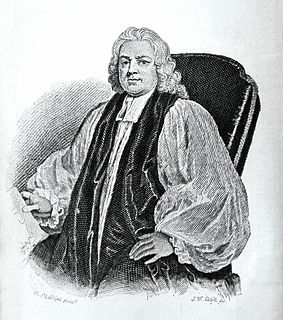Related Research Articles

The Isle of Man had become separated from Great Britain and Ireland by 6500 BC. It appears that colonisation took place by sea sometime during the Mesolithic era. The island has been visited by various raiders and trading peoples over the years. After being settled by people from Ireland in the first millennium AD, the Isle of Man was converted to Christianity and then suffered raids by Vikings from Norway. After becoming subject to Norwegian suzerainty as part of the Kingdom of Mann and the Isles, the Isle of Man later became a possession of the Scottish and then the English crowns.

The manorial system of New France, known as the seigneurial system, was the semi-feudal system of land tenure used in the North American French colonial empire.

A tenant farmer is one who resides on land owned by a landlord. Tenant farming is an agricultural production system in which landowners contribute their land and often a measure of operating capital and management, while tenant farmers contribute their labor along with at times varying amounts of capital and management. Depending on the contract, tenants can make payments to the owner either of a fixed portion of the product, in cash or in a combination. The rights the tenant has over the land, the form, and measures of payment varies across systems. In some systems, the tenant could be evicted at whim ; in others, the landowner and tenant sign a contract for a fixed number of years. In most developed countries today, at least some restrictions are placed on the rights of landlords to evict tenants under normal circumstances.

Earl of Cromartie is a title that has been created twice, both for members of the Mackenzie family. It was first created as Earl of Cromarty in the Peerage of Scotland in 1703 for Sir George Mackenzie, 2nd Baronet, but his titles were forfeited after the Jacobite rising of 1745. It was recreated in 1861 in the Peerage of the United Kingdom for Anne Sutherland-Leveson-Gower, Duchess of Sutherland. Since 1979, the Earl of Cromartie has been chief of Clan Mackenzie.

Lord of the manor is a title that, in Anglo-Saxon England, referred to the landholder of a rural estate. The lord enjoyed manorial rights as well as seignory, the right to grant or draw benefit from the estate. The title continues in modern England and Wales as a legally recognised form of property that can be held independently of its historical rights. It may belong entirely to one person or be a moiety shared with other people.

Quia Emptores is a statute passed by the Parliament of England in 1290 during the reign of Edward I that prevented tenants from alienating their lands to others by subinfeudation, instead requiring all tenants who wished to alienate their land to do so by substitution. The statute, along with its companion statute Quo Warranto also passed in 1290, was intended to remedy land ownership disputes and consequent financial difficulties that had resulted from the decline of the traditional feudal system in England during the High Middle Ages. The name Quia Emptores derives from the first two words of the statute in its original mediaeval Latin, which can be translated as "because the buyers". Its long title is A Statute of our Lord The King, concerning the Selling and Buying of Land. It is also cited as the Statute of Westminster III, one of many English and British statutes with that title.

The Act for the Setling of Ireland imposed penalties including death and land confiscation against participants and bystanders of the Irish Rebellion of 1641 and subsequent unrest.

George Mackenzie, 1st Earl of Cromartie FRS (1630–1714), known as Sir George Mackenzie, 2nd Baronet from 1654 to 1685 and as The Viscount of Tarbat from 1685 to 1703, was a Scottish statesman.

Illiam Dhone or Illiam Dhôan, also known as William Christian, was a Manx politician and depending on viewpoint, patriot, rebel or traitor. He was a son of Ewan Christian, a deemster. In Manx, Illiam Dhone literally translates to Brown William—an epithet he received due to his dark hair, and in English he was called Brown-haired William. Dhone was a significant figure in the Isle of Man during the English Civil War and the Manx Rebellion of 1651. He was executed for high treason in 1663. In the centuries after his death he has become a "martyr and folk-hero, a symbol of the Island's cherished freedoms and traditional rights".
The Settled Land Acts were a series of English land law enactments concerning the limits of creating a settlement, a conveyancing device used by a property owner who wants to ensure that provision of future generations of his family.

Appleby Parva, or Little Appleby, part of the parish of Appleby Magna in Leicestershire, is a hamlet about 1 mile (1.6 km) south-west of Appleby church. It straddles the A444, south of the crossroads of the highways from Ashby de la Zouch to Tamworth, from Atherstone to Burton upon Trent and Junction 11 of the M42/A42. Appleby Magna and Appleby Parva are usually collectively known as Appleby.

Thomas Wilson was Bishop of Sodor and Man between 1697 and 1755.

A heerlijkheid was a landed estate that served as the lowest administrative and judicial unit in rural areas in the Dutch-speaking Low Countries before 1800. It originated as a unit of lordship under the feudal system during the Middle Ages. The English equivalents are manor, seigniory, and lordship. The German equivalent is Herrschaft. The heerlijkheid system was the Dutch version of manorialism that prevailed in the Low Countries and was the precursor to the modern municipality system in the Netherlands and Flemish Belgium.
The history of English land law can be traced for eons, into Roman times, and through the Early Middle Ages under post-Roman chieftains and Saxon monarchs where, as for most of human history, land was the dominant source of personal wealth. English land law transformed further from the Saxon days, to post-Norman Invasion feudal encastellation, from the Industrial Revolution and over the 19th century, as the political power of the landed aristocracy diminished, and modern legislation increasingly made land a social form of wealth, subject to extensive social regulation, such as for housing, national parks, and agriculture.

The lord of Mann is the lord proprietor and head of state of the Isle of Man. The current lord proprietor and head of state is Elizabeth II. Before 1504 the head of state was known as King of Mann.

Appleby Hall was a manor house or stately home built in the small hamlet of Appleby Parva, on the outskirts of Appleby Magna.

The 1st Parliament of Queen Anne was summoned by Queen Anne of England on 2 July 1702 and assembled on 20 August 1702. Its composition was 298 Tories, 184 Whigs and 31 others, representing a large swing to the Tories since the previous election. Robert Harley, the member for Radnor, was re-elected Speaker of the House of Commons.
Ewan Christian was a Manx politician and landowner on the Isle of Man. He held the position of deemster for 51 years from 1605 until his death. He also held the position of Deputy-Governor of the Isle of Man 1634 to 1637. He was the father of controversial Manx political revolutionary and folk-hero Illiam Dhone.
The Manx Rebellion of 1651 was an uprising against the ruler of the Isle of Man during the English Civil War. It was led by William Christian, better known by the epithet Illiam Dhone, due to his dark hair. The Rebellion was mainly in response to agrarian and land ownership reforms enacted by Lord of Mann James Stanley, 7th Earl of Derby, and the increased burden on the Manx people during the English Civil War. It was a bloodless coup with English Parliamentary forces taking control of the island. The Rebellion temporarily ended control of the Isle of Man by the Stanley family until the Restoration when King Charles II returned from exile in Europe.